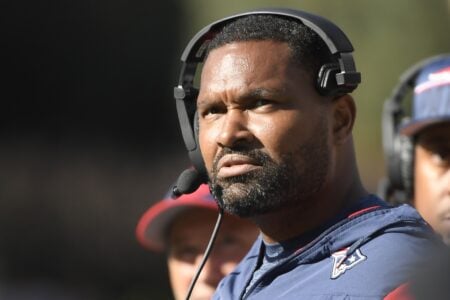look at Buffalo. They have had 15 years of sellouts at their stadium without playoffs. Their fans are till loyal and crazy for football on Sundays. They can also blame the likes of Wilson and Donahoe for the team' putridness. Trading away #1 draft choices for the rights to JP Losman isn't going to win many games. In an uncapped environment, Bills fans will stop attending the games, and stop watching altogether.
??? Did you watch the Pats all those years when they weren't competitive? I hope you don't think Bills fans aren;t as fanatical aobut their team as we are about ours. You aren't one of htose post 2001 fans, are you?
THe BIlls suck, with or without a cap.
If Bills games don't sell out, the game will be on TV where more people can watch them suck.
Because the lack of a cap will not cause the Bills to suck. The Bills (and Raiders and Cards and Lions and etc) suck now
with a cap, and NFL TV revenues are terriffic. Why will NFL TV revenues plummet because they will suck without a cap? I doubt if many fans will get into fnancial discussions about the cause of sucking.
The big, fat juicy TV contracts are not that huge because of teams like the Bills, and the fact that they lose a lot of games.
The lack of a cap will cause some teams to not be competitive. I agree with that, but the NFL has that situation now, and still have huge TV revenues. THe future: nothing much will change about the competitiveness you seem so concerned about as a cause of no TV revenues.
Your doomsday scenario (some teams not competitive) is not the future. It is the present and the past.
Right now, all 32 NFL teams are not all competitive. THere are four or five NFL teams you expect to loss every game the play, unless they have the good fortune to play each other or hit the "any given SUnday" lottery. Also, there are four or five teams that manage the cap very well and/or are good at personel acquisition and year after year we expect them to win every game they play except for "any given Sunday") and when they play each other, games which are highly sought after games.
Should the cap go away, I would expect the same rough breakdown of competiveness. Different teams, maybe, but still I would expect there to be four or five teams you expect to lose every game they will play, unless they have the good fortune to play each other or hit the "any given Sunday" lottery. Also, there will be four or five teams that have deep pockets and/or are good at personel acquisition and year after year we expect them to win every game they play except for "any given Sunday" and when they play each other, games which will be highly sought after games.
So my question is: Why will
NFL TV revenues drop? We will have the exact same situation. The only difference will be some of the elite will change as cap smarts will be replaced with deep pockets (a premium on good personnel acquisition will still be a plus).


















